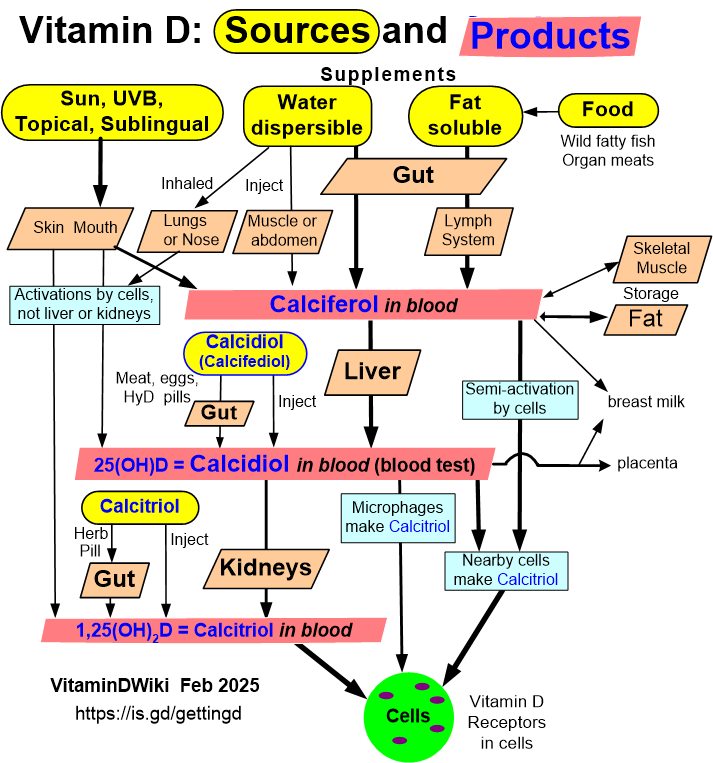Vitamin D injection is far better than oral for diabetics (poor gut) – RCT
:: See also similar studies at the bottom of this page ::
Guesses of Vitamin D response if poor gut
| ** | ||||
|---|---|---|---|---|
| Bio | Form | Speed | Duration | |
| 10 | Injection ($$$) or Calcidiol or Calcitriol |
D - Slow C -Fast |
Long | |
| 10 | Sun/UVB | Slow | Long | |
| 10 | Topical (skin patch/cream, vagina) |
Slow Fast nano |
Normal | |
| 9 | Nanoemulsion -mucosal perhaps activates VDR |
Fast | Normal | |
| 9? | Inhaled (future) | Fast | Normal | |
| 8 | Bio-D-Mulsion Forte | Normal | Normal | |
| 6 | Water soluble (Bio-Tech) | Normal | Normal | |
| 4 | Sublingual/spray (some goes into gut) |
Fast | Normal | |
| 3 | Coconut oil based | Slow | Normal | |
| 2 | Food (salmon etc.) | Slow | Normal | |
| 2 | Olive oil based (majority) | Slow | Normal | ** |
10= best bioavailable, 0 = worst, guesses have a range of +-2
Speed: Fast ~2-6 hours, Slow ~10-30 hours
Duration: Long ~3-6 months, Normal = ~2 months
Poor gut is associated with Gut diseases as well as Diabetes, Multiple Sclerosis, and many other diseases
Reminder - Vitamin D is absorbed in the first portion of the small intestine
Some gut problems which only occur in large intestine may not be a problem
On-going research at VitaminDWiki as of March 2017
Getting Vitamin D into your blood and cells has details on each thype of vitamin D and the following chart

Parenteral vitamin D supplementation is superior to oral in vitamin D insufficient patients with type 2 diabetes mellitus
Diabetes & Metabolic Syndrome: Clinical Research & Reviews. online 6 March 2017, http://dx.doi.org/10.1016/j.dsx.2017.03.019
Awanindra Dwivedia, Balram Guptaa, Shalbha Tiwaria, d, Daliparthy D. Pratyusha, d, Saurabh Singhc, Surya Kumar Singha, sksendocrine@yahoo.com
Background/objectives
Oral vitamin D supplementation is better than parenteral in improving vitamin D deficiency in individuals with no systemic illness. Our aim was to compare the efficacy of oral and parenteral routes of vitamin D supplementation on circulating serum 25(OH) vitamin D level in patients with type 2 diabetes mellitus.
Methods
Total 85 cases of with type 2 diabetes mellitus were screened for vitamin D status of which 71 patients were vitamin D insufficient/deficient. They were randomized into two intent to treat groups with different vitamin D supplementation protocols
(a) Oral-60000 IU per day for 5 days (group I; n = 40) and
(b) injectable-300000 IU intramuscularly once (group II; n = 31).
Baseline and one-month post supplementation 25(OH) vitamin D levels were measured in both the groups.
Results
Baseline clinical characteristics and 25(OH) vitamin D levels were comparable in both the groups. Post treatment 25(OH) vitamin D level in
group I was 26.06 ± 9.06 ng/ml and in
group II was 49.69 ± 18.92 ng/ml.
After one month of vitamin D supplementation, increment in 25(OH) vitamin D level from baseline was significantly higher in group II than group I (p < 0.001).
Interpretation & conclusions
Injectable method of supplementation was better than oral route in improving serum 25 (OH) vitamin D status in patients with type 2 diabetes. The study suggested impaired absorption of vitamin D from the gastrointestinal tract in patients with type 2 diabetes mellitus and a need for parenteral route of vitamin D supplementation in deficient patients with type 2 diabetes mellitus.
Publisher wants $31.50 for the PDF
Purchased by VitaminDWiki
Injection references in the study
- Comparison of oral versus injectable vitamin-D for the treatment of nutritional vitamin-D deficiency rickets July 2009
- "injectable form was shown to be statistically significant" Can request full text at ResearchGate
- Treatment of Hypovitaminosis D With Pharmacologic Doses of Cholecalciferol, Oral vs Intramuscular Medscape 2013
- full text online, RCT, no difference for people without digestive problems
- 📄 Download the PDF from VitaminDWiki
- A Randomized controlled trial on safety and efficacy of single intramuscular versus staggered oral dose of 600 000IU Vitamin D in treatment of nutritional rickets. Jun 2014 📄 Download the PDF from VitaminDWiki
Bone Mineral Density - oral vs injection -Oct 2015
Full text online. 10 weeks of 60,000 IU vs 1 600,000 IU injection + daily 1 gram of Calcium
- "Although, with intramuscular route the serum vitamin D levels are maintained for 12 months, there is no improvement in BMD byeither route."
- Sufficiency (> 30 ng) at 12 month:s 85.7% injection, 22.9%. oral

Short URL = is.gd/BioForms

